|
|
Blog Archives:
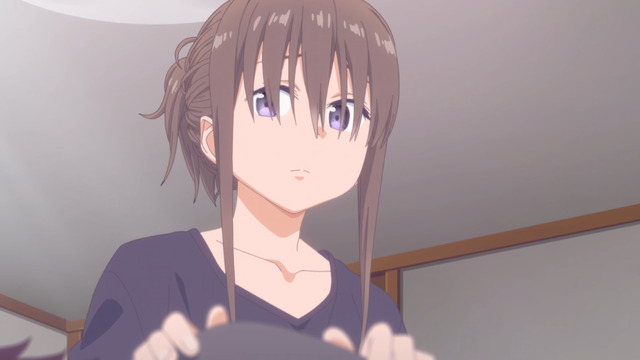
I know it's her (other) gimmick, but these are some fucked-up bangs.
Getsuyōbi no Tawawa 2 (Tawawa on Monday 2) is a follow-up to an Autumn 2016 adaption of Himura Kiseki's weekly illustrations that publish on the Twitter every Monday. There's continuity and regular characters whose lives intersect with otherwise unrelated story arcs. But really it's just an exercise in randy situation comedies involving enormous breasts. The anime episodes are short and faithfully follow the various stories, but it still looks weird to me without the blue-ink monochrome of the source material.
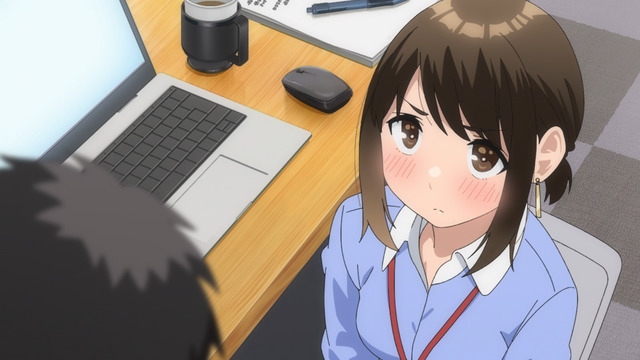
Never gonna happen.
Ganbare Dōki-chan (You Can Do It Dōki-chan) is another anime short and was paired with the Tawawa sequel for its debut because the Douki-chan artist and the Getsuyōbi no Tawawa artist collaborate on occasion. Unlike the Tawawa illustrations, Douki-chan follows a single story arc. Its titular heroine is a lovesick office lady who lacks the confidence to express her feelings to the co-worker she admires. Complicating the effort are myriad assertive rivals who always seem to appear at inopportune moments. Both Getsuyōbi no Tawawa 2 and Ganbare Dōki-chan have already concluded their 12-episode runs because they started toward the end of the Summer 2021 anime season. As anime adaptations go, they were all right, but it's good their episodes were short. I don't think either would have worked with full-length episodes.
Posted in Ganbare Dōki-chan, Tawawa on Monday | Tags: 16-year-old love interests, Autumn 2021, Bend Her Over a Kotatsu, Built for Sin, Childhood Friend, Fan Service, Hair, Initial impressions, Kayano Ai, Love Confessions, Love Triangle, May-December Romances, Plying Girls, Romance, Season Introduction, Sequels, Sex, Summer 2021, Turbo Lesbians, Twitter, Unrequited Love | Permanent Link
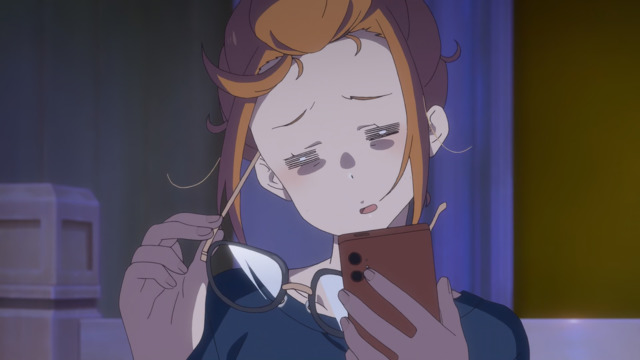
Despite appearances, Kanon is good at waking up in the morning.
Love Live! Superstar!! only had 12 episodes, but they spanned both the Summer 2021 and Autumn 2021 anime seasons in order to accommodate the Tokyo Olympics. It was also the best Love Live! anime of the franchise, for basically all the reasons SDS already covered at Ogiue Maniax. I presume others have also expressed the same view for similar reasons, and maybe I'd even know about them if anime blogging weren't dead.
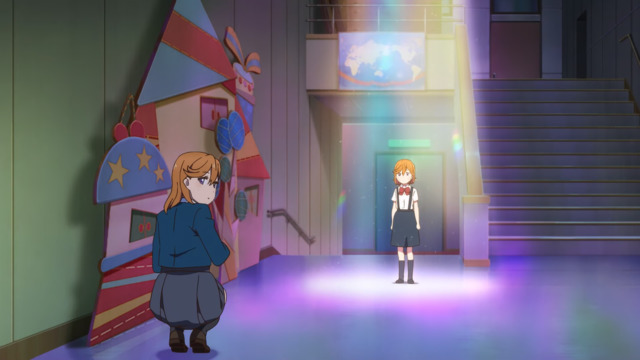
This child is full of lies.
Notably, its lead, Shibuya Kanon, felt most like a genuine person among all the various characters of the Love Live! cinematic universe galaxy. I understand there are Honoka fans with a great deal of fondness for that character's development, but I've always regarded her as a casualty of a franchise that I find (as a whole) sort of off-putting in myriad minor ways that clearly don't bother real fans. Still, this is why I can't consider myself an actual Love Live! fan, and it's why I'm ambivalent about the show most of the time.
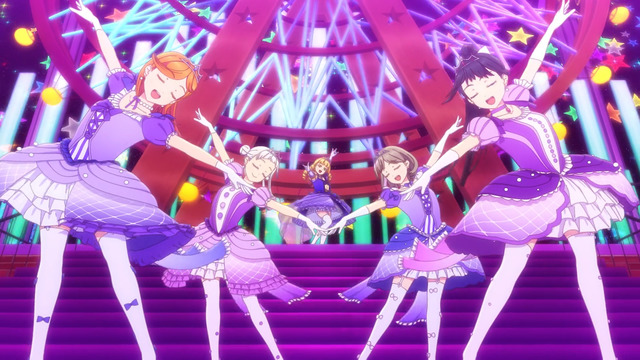
The all-singing, all-dancing 3DCG has come a long way.
However, Love Live! Superstar!! really got it right by keeping its cast of idols smaller than those of its predecessors. Devoting more time to them individually gave me, as a viewer, more opportunities to find reasons to care about them. True, Keke and Sumiere seem more like "wacky characters" than "actual characters." Likewise, Ren and Chisato seem more like capital-S, capital-C Supporting Characters to me than members of an ensemble cast.
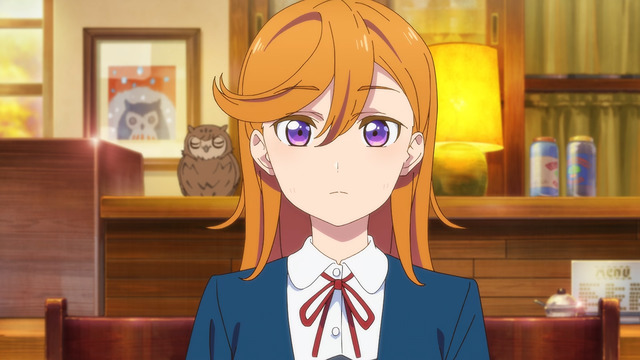
I still like Kanon best even though she has fucked-up hair.
In that sense, Kanon is the only True Character of the series, which I guess is why I regard Love Live! Superstar!! as being her show. Consequently, I guess she's also the titular superstar by default. I mean, she's not a superstar in the way that Sheryl Fuckin' Nome is a God damn superstar, but I've got no problem naming her as the overall Love Live! BEST GIRL. That she achieves this by tackling relatable problems and without the benefit (benefit?) of high-tension melodrama is a testament to what the franchise finally got right.
Posted in BEST GIRL, Love Live! School Idol Project, Love Live! Superstar!! | Tags: Autumn 2021, Childhood Friend, Hair, Idols, Season Conclusion, Summer 2021, Turbo Lesbians | Permanent Link
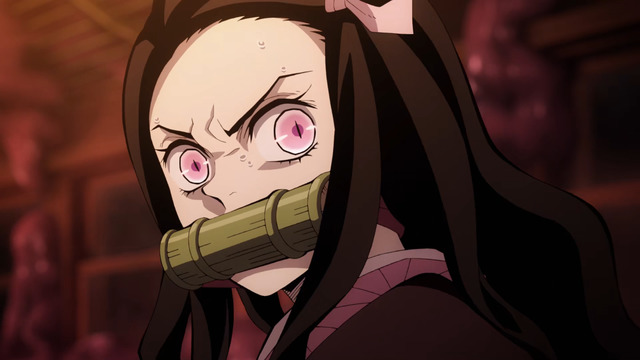
Nezuko gets to do something.
I enjoyed the first season of Kimetsu no Yaiba (Demon Slayer) and also thought its Mugen Train movie was good. I'm hardly alone in having this opinion, as the series proved hugely popular, resulting in enormous sales for the manga on which it is based. Similarly, Gekijouban Kimetsu no Yaiba: Mugen Ressha-hen did extremely well in theaters, surpassing Spirited Away to become Japan's box office champion. The movie follows the events from the first anime season, and there was initially some concern the second TV season would pick up from where the movie left off, thus making it required viewing from a continuity standpoint.
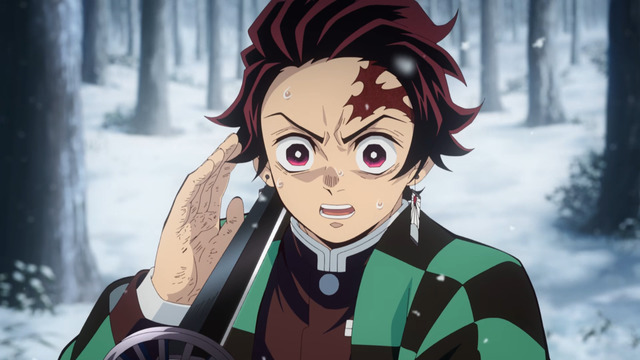
You sure about this?
Instead, the Mugen Train movie is being spread out over the first nine episodes of the second season of Kimetsu no Yaiba. After this arc concludes on Saturday, the entertainment district arc will reportedly begin, although I'm unsure how many episodes that will run. Re-watching the movie as television episodes has not been ideal. It doesn't seem as if there are major edits or changes to the ordering of scenes to accommodate the time constraints of television episodes, but the experience seems flawed.
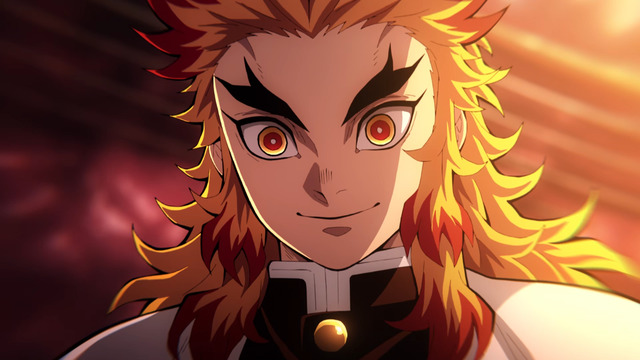
These are some eyebrows.
As far as I can tell, the reason for this effect is because of the weekly interruptions breaking up the impacts of both the narrative and the action scenes. It's a fairly obvious or at least foreseeable consequence of repackaging the movie into a different format, but more pronounced than I anticipated. Nevertheless, I don't think it would have made sense to re-create the entire arc with the television format in mind, so this probably was the best option. Besides, it's not as if the arc is actually bad this way—it mostly just fails to match its own standard.
Posted in Kimetsu no Yaiba, ufotable | Tags: Autumn 2021, Initial impressions, Movies and OVAs, Season Introduction, Sequels, Shounen Jive | Permanent Link
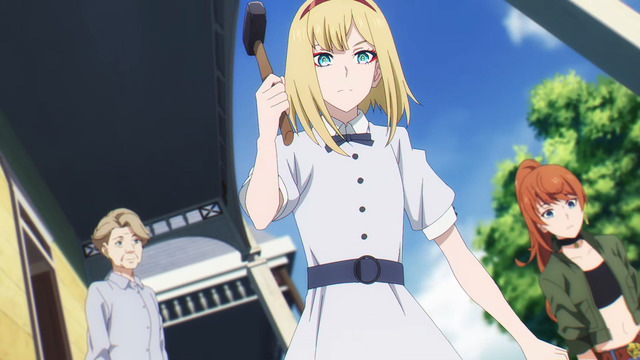
To a Musicart with a hammer, everything looks like a nail.
I'm adding braces and styling the title of {tákt: op. Destiny} this way because doing so approximates how it appears in the anime. It also seems appropriate because the series itself is also very stylish, possibly to its detriment. It is a neat looking show, but I don't know if I can call it good. Nevertheless, at a minimum, the idea of using eccentric superpowered girls to fight off the monsters that attack whenever they detect music is sort of interesting. It's not exactly the sort of anime that everyone will like, though.
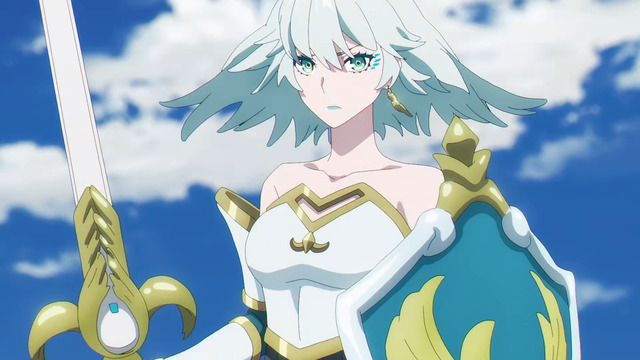
Walküre should definitely be singing while fighting.
It would probably benefit {tákt: op. Destiny} to feature more music. Since the focus is on classical music, I guess it's not realistic to expect the Musicarts to sing while fighting, Symphogear style. I would absolutely enjoy an aria or two, but Takagaki Ayahi is not in the cast, and I don't expect there are many other seiyuu who would theoretically be up to the task.
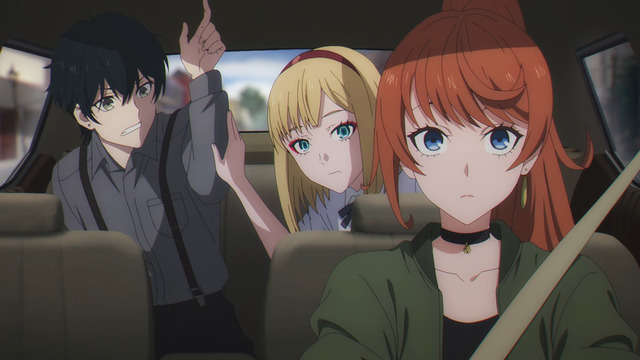
I find it odd that no one is riding shotgun.
This is also a road trip anime. I appreciate those because they're sort of rare. (I get the feeling Japan's extensive rail infrastructure contributes to the relative scarcity of road trip anime.) It works here because {tákt: op. Destiny} is set in the United States. I guess it's not technically a road trip anime, but there is a road trip in it. Close enough, eh.
Posted in Takt Op. Destiny | Tags: Autumn 2021, Classical Music, Girls With Guns, Initial impressions, Music, Season Introduction, Ueda Reina, War Is All Hell | Permanent Link
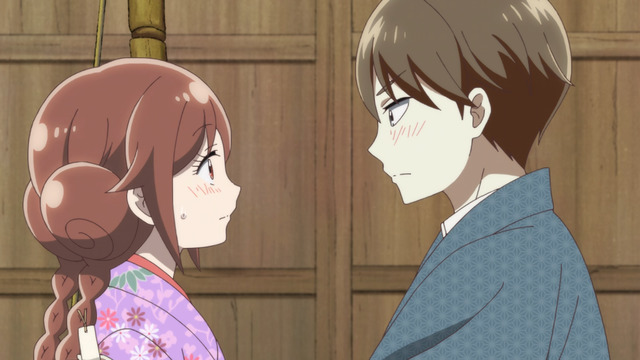
Kiss her, you idiot.
Taishō Otome Otogibanashi (Taishō Otome Fairy Tale) is about a Taishou-era 17-year-old rich kid who loses the use of his right arm in a car accident that also kills his mother. Subsequently, his hateful father banishes him out of sight to a house overlooking a small village. Oh, and the father buys the guy a tiny, freakishly cheerful, 14-year-old girl to be the dour boy's wife.
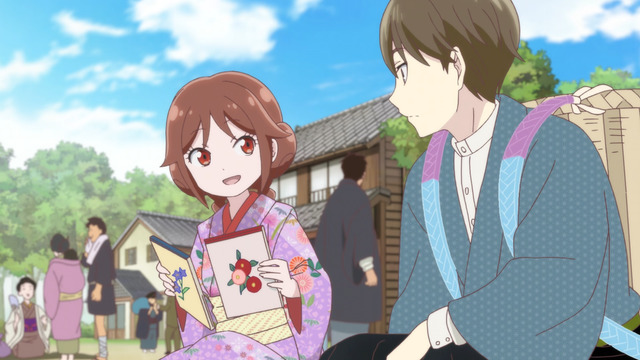
Those are some colorful straps.
I was expecting some plot twists leading to melodrama, or at least a revelation or two about why the girl is so pleasant all the time despite her predicament. Tamahiko, the boy, has a fairly negative outlook on the world, and the series balances this with Yuzuki's constant—and apparently earnest—cheerfulness. After five episodes, it's looking less and less like Yuzuki might be harboring some dark secret. Maybe this series really is what it appears to be.
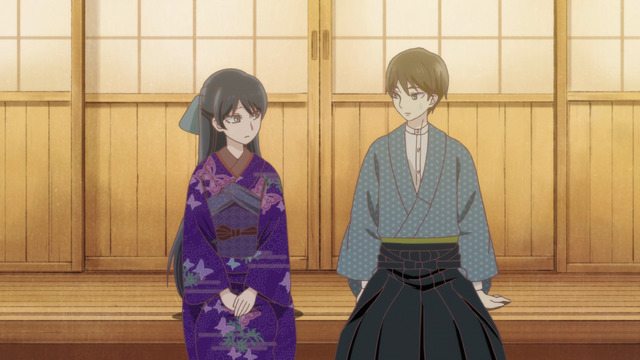
Dude's 12-year-old sister turned out to be okay.
I will be disappointed if Yuzuki simply has no problems with being sold as a child bride to a complete stranger to help cover a family member's debt, and lacks any agency or complex character traits of her own. It's probably also worth pointing out some similarities to Ai Yori Aoshi also exist, at least on the surface level. Unfortunately, as flawed as Ai Yori Aoshi is, it still bests Taishou Otome Otogibanashi in terms of both drama and romance. Nevertheless, I plan to continue watching Taisho Otome Fairy Tale. The show itself is fine. I don't genuinely have any meaningful issues with it, even if it is seemingly offensive in principle.
Posted in Taishou Otome Otogibanashi | Tags: Autumn 2021, Bend Her Over a Kotatsu, Hair, Initial impressions, Romance, Season Introduction, tsundere | Permanent Link
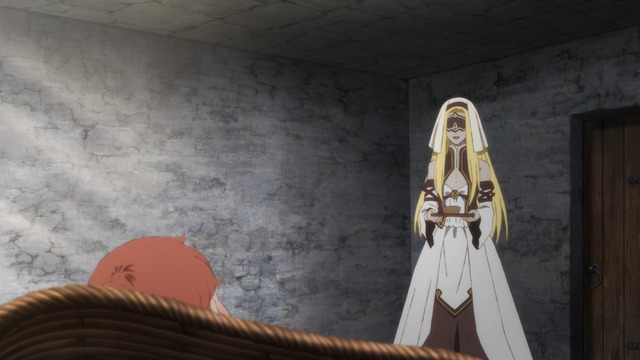
I would not have known she was a mummy if the series hadn't said so.
I wasn't planning on watching Saihate no Paladin (The Faraway Paladin) this season, but the first episode was better than I was expecting, and it turns out Hocchan is in this. When I say it was "better than I was expecting," I'm not suggesting it blew me away. Rather, I was just relieved it avoided most of the dumb isekai x JRPG nonsense I expected. Also, the storytelling was deliberate and did not rush through its setup, and I appreciated that.
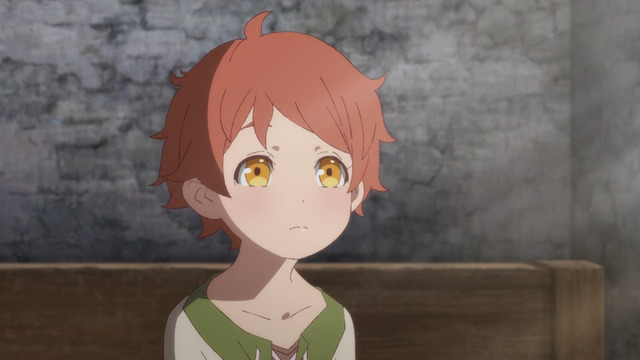
There were no horny-baby jokes in this show.
That said, the pacing does seem sort of slow for an anime. Or, I guess I should clarify, it seems slow for a single-cours anime. I'm four episodes through its 12-episode run, and I have no idea what its plot or main story is going to be. This would be fine if subsequent seasons are planned, but it does seem as if a read-the-books non-ending ending is the most likely outcome. I have heard the books are good, so maybe that is the way to go. Then again, I've heard "the books are good" said about a whole lot of stuff which only turned out to be good for sufficiently broad definitions of good, so why should this be any different?
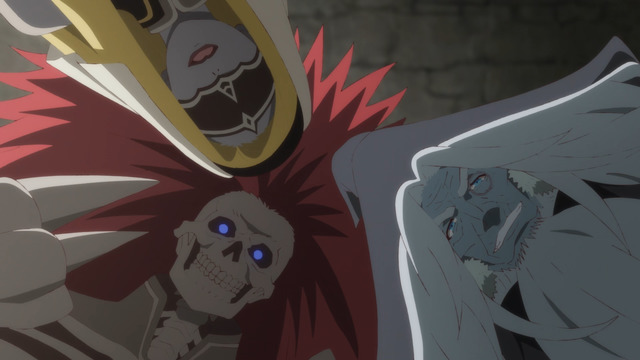
An isekai protagonist and his three undead parents can be a family.
Well, the isekai aspect is relatively muted so far. Where it has appeared, it mostly relates to William's dissatisfaction with his old life and his commitment to becoming a better person now that he's been given a second chance. Notably, he seems committed to following the less traveled path of becoming a better person by, you know, being a better person instead of coasting down the "becoming a better person by exploiting a fortuitous cheat power and basking in the adoration of comely, nubile companions who are attached to him" sluice. So yeah, it's at least plausible the books are actually good.
Posted in Saihate no Paladin | Tags: Autumn 2021, First Episode, Initial impressions, Light Novels, Season Introduction, Yui Horie | Permanent Link
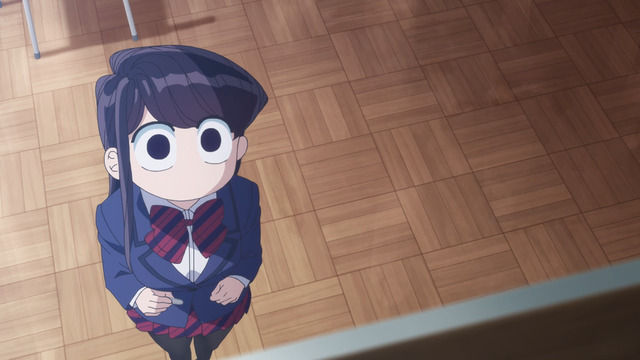
This is the good stuff.
I was only mildly interested in watching the Komi-san wa, Komyushou desu. (Komi Can’t Communicate) anime because I lost interest in the manga fairly quickly. I mean, the basic premise is fine, and the characters are all right, but there wasn't enough going for it to help it compete against all the other titles I'm reading. Honestly, the best thing in its favor was Komi's bug-eyed nervous face when she's confronted with something emotionally challenging.
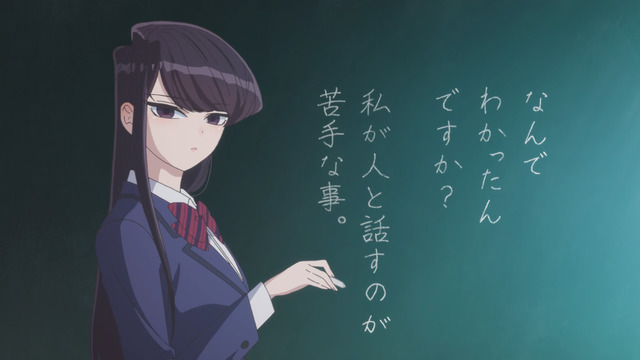
Komi's non-anxious form looks sort of weird, honestly.
Fortunately for the Komi-san anime, this visage is something the anime captured perfectly. The anime also devoted a surprising amount of attention to the shading and texture of Komi's stockinged legs, so maybe I shouldn't be surprised it got her comic form right. This brings me to my main reason for suggesting the Komi-san wa, Komyushou desu. anime is worth a shot: Its animation is unusually high-effort. The production values for this show went above and beyond what I would expect of a series that takes place largely at a school. There are visual flourishes everywhere. It's impressive without becoming distracting.
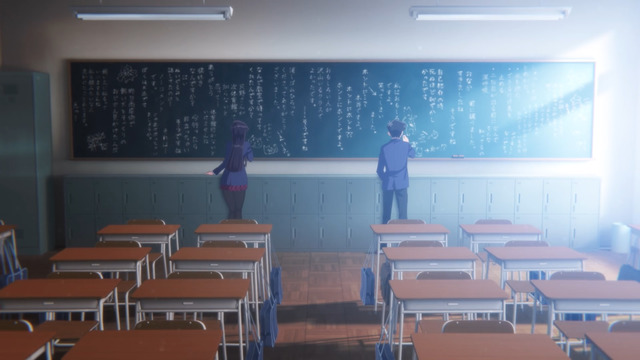
Such is the power of ditching gym class.
With regard to the Netflix, the U.S. release is a few weeks behind the Japanese one. (And it's even a week-by-week release instead of a binge-friendly dump like most typical shows on the Netflix.) Consequently, you may have seen some criticism about the lack of translated on-screen text in the official release, especially compared against what you might expect from, say, a fansub. There is a lot of text that was not translated in the first episode of the official release, but that episode had A LOT of text in general.
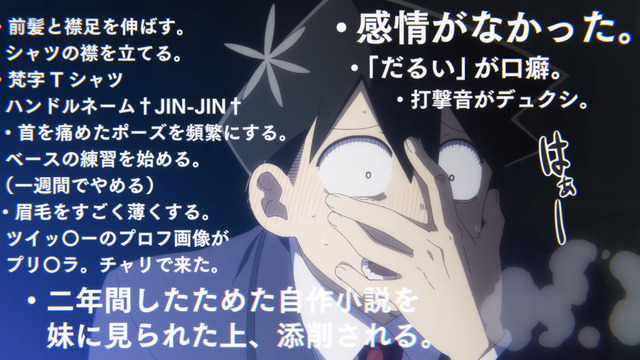
For real, that episode was wall-to-wall on-screen text.
But to be clear, we're not talking about an assault against typesetting in general (cf. the FUNimation's infamous three-line attacks), but rather the Netflix appears to have prioritized what on-screen text was critical to translate and what it could omit because it would either be apparent by context or be too difficult to read without pausing. In that sense, I'm okay with those decisions (at least for the first episode, anyway). Purists who want everything translated, even if it means pausing scenes at various points to read it all will be better off hunting for fansubs, but I don't think viewers who prefer to watch episodes all the way through without interruptions will find the specific omissions in the official release objectionable.
Posted in Komi-san wa, Komyushou desu. | Tags: Autumn 2021, First Episode, First Girl He Sees Clause, Initial impressions, Legs that go up to her neck, Season Introduction | Permanent Link
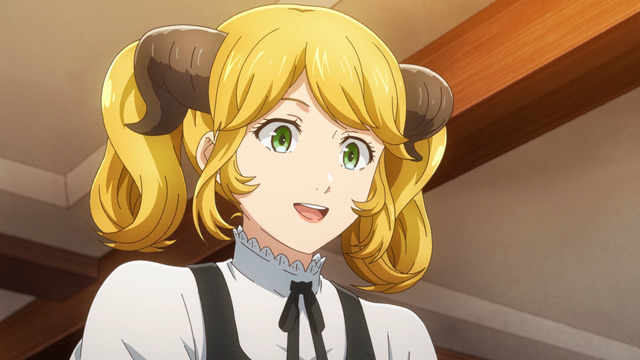
Aletta is pleasant.
There's honestly not all that much to Isekai Shokudou (Restaurant to Another World), but I enjoyed the first season enough to watch its sequel. Isekai Shokudou 2 continues its first season's parade of enthusiastic patrons whose displays of excitement are not entirely over the top, unlike some other food-reaction-shot anime. I at least don't remember any guests literally orgasming from their meals.
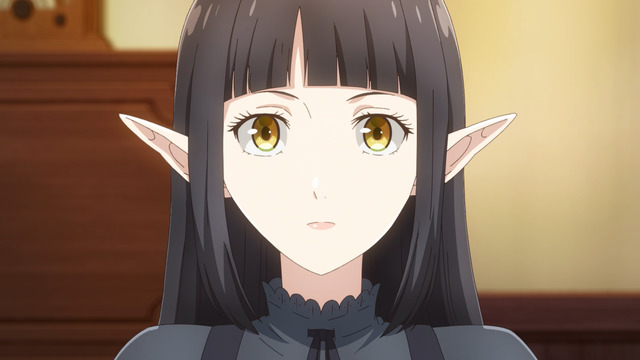
Kuro is pleasant on the inside.
There's also not really very much tension or drama. There are a number of side plots related to the customers and how they happened to find the magic door to the restaurant, but these are also secondary to showing off the various dishes and encouraging viewers to try them. In that respect, Restaurant to Another World is fairly successful. At a minimum, it's a reminder that I have available to me an incredible assortment of different cuisines and the means to sample them (even if they do cost more than a few coppers, typically). I should probably do so more often. I don't even need to travel to another world to do it.
Posted in Isekai Shokudou | Tags: Autumn 2021, Food, Initial impressions, Light Novels, Season Introduction, Sequels, Ueda Reina | Permanent Link
|
|


























